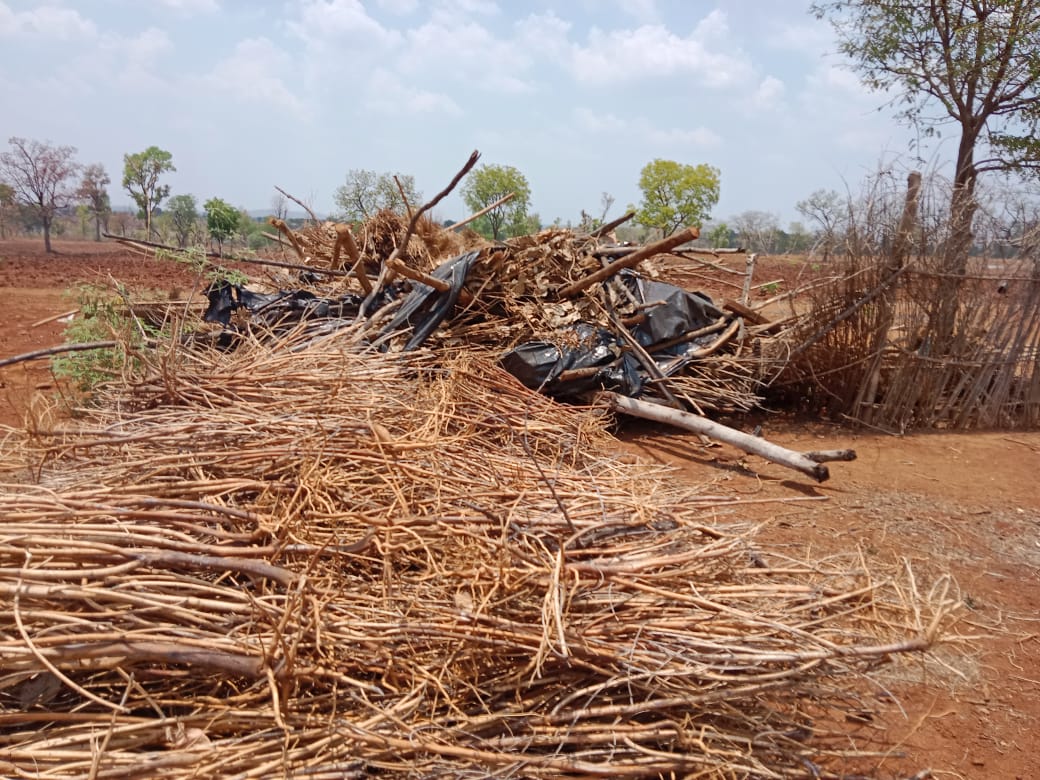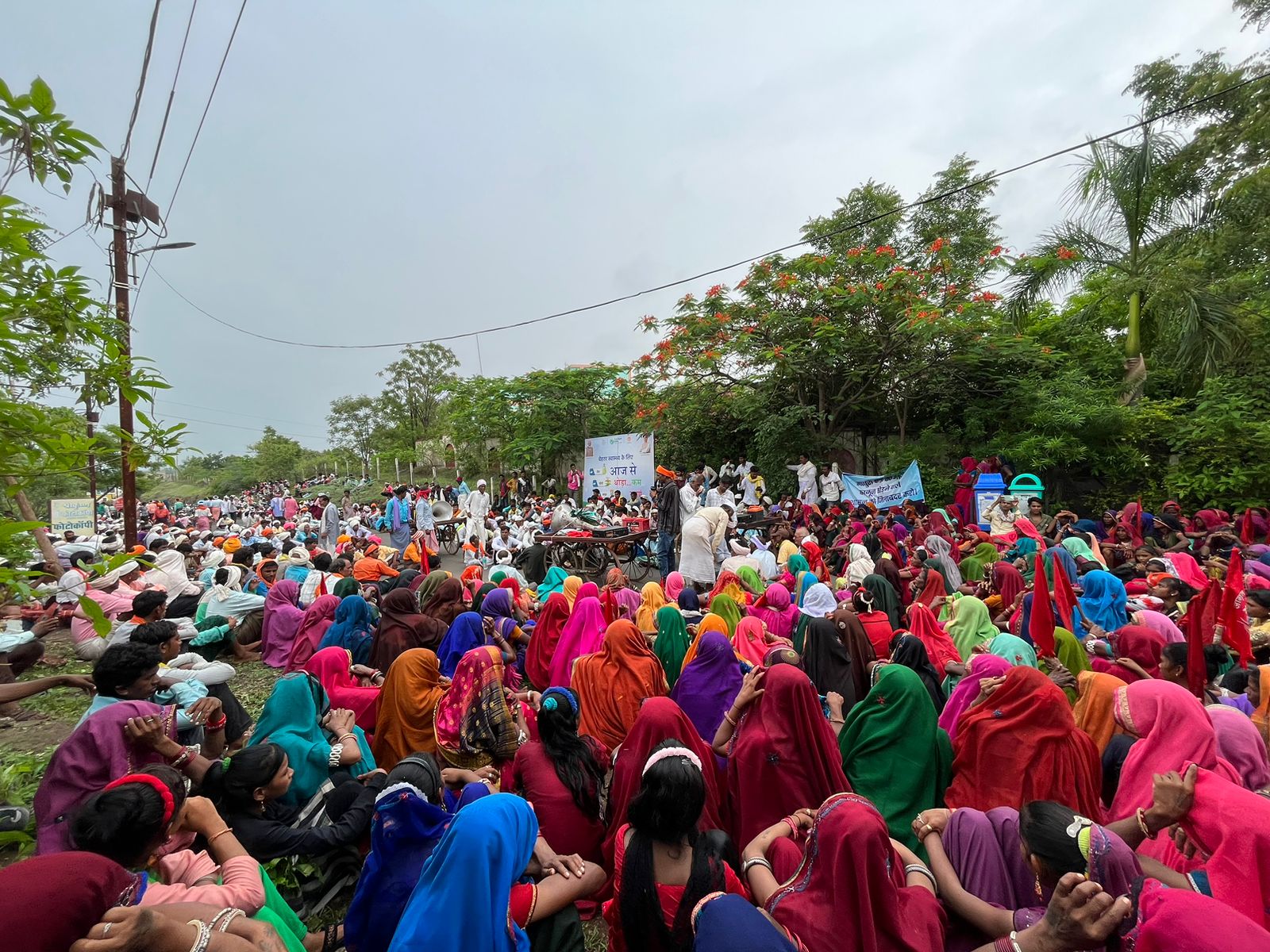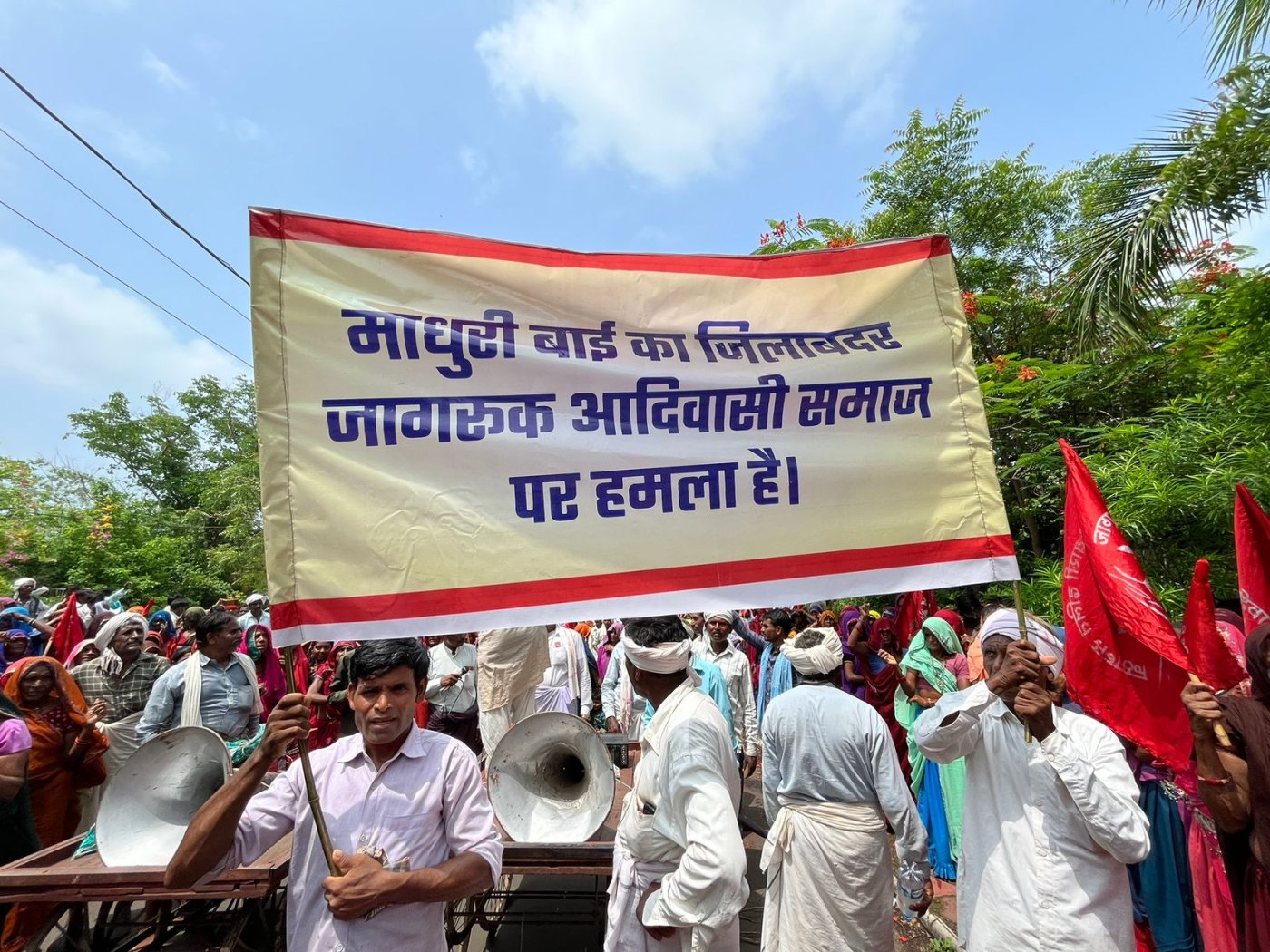Burhanpur, Madhya Pradesh: On 12 May 2023, authorities demolished 25 homes of Adivasi villagers in Bhilaikheda, a village in southern Madhya Pradesh’s Khandwa district. No eviction notices had been served. With the demolition carried out under the watchful eye of a large contingent of policemen, residents did not dare plead their case with the authorities, they said.
Five days later, on 17 May, Adivasis in Tangiapat village in Burhanpur, also in southern Madhya Pradesh, saw 14 of their homes demolished, again with no prior notice.
“I was in Burhanpur city when I received a call from my family that day,” said Anant Singh, a 45-year-old Gond Adivasi farmer from Tangiapat. “I rushed home and discovered that a large number of policemen and forest department officers were gathered near my house.”
He said they had not been served a notice, nor given a chance to present their case, and had been unjustly branded as encroachers.
“They threatened us saying if we tried to explain the rules and rights of tribal people, they would file a case against us,” he said, “and make sure we remained in jail.”
Anant Singh later wrote to the district magistrate of Burhanpur seeking compensation, but received no response.
Also among several forest-dwellers whose houses were destroyed by the state forest department in May, Jabar Singh, a 52-year-old tribal resident of Tangiapat, expressed confusion and frustration over the forest department's demolition of his mud-walled home. He said, “We have been living in this area for generations.”
Jabar Singh said his family lost stored groceries including maize, tur (pigeon pea), rice and other staples meant to last the family all year. The demolition team destroyed the stored goods without giving the family time to collect any of their belongings.
“It is now very difficult for me to feed my family,” he said sadly. Shrubs and plants the family had grown were also destroyed, Jabar Singh added. Since the demolition in May, he and others from his community have been living in makeshift shelters located close to the forest land that they have traditionally been dependent on.
Shashank Tiwari, an advocate at the Jabalpur high court, said claims filed under the Scheduled Tribes and Other Traditional Forest Dwellers (Recognition Of Rights) Act, 2006, commonly called the Forest Rights Act or FRA, by Adivasi families in Bhilaikheda village were rejected without due process being followed, “in violation of the Forest Rights Act”.
He said all those whose houses were demolished had registered their claims to the land under the FRA. “Any attempt to evict claimants before the verification process is completed is strictly prohibited according to section 4 (5) (pertaining to prohibiting evictions until recognition and verification procedure is complete) of the FRA.”
This is not a rare instance in Madhya Pradesh of houses being bulldozed by forest department officials on grounds that they are alleged encroachments. In June, houses of 10 families were demolished in Repura village of Sagar district by forest department officials. The affected families alleged that they were not given any prior notice or opportunity to retrieve their belongings, including food stocks and clothing, before the demolition took place.
The demolitions also followed a trend witnessed in several Indian states, including New Delhi, MP and Gujarat, where selective demolition of homes has targeted minority communities, often without due process being followed. Article 14 has reported (here and here) that these demolitions have violated law and court judgements.
Of the 10 houses demolished in Sagar, six had been built under the Pradhan Mantri Awas Yojana, a flagship programme that aimed to provide, by 2022, a pucca house, with basic amenities, to all “houseless householder and those households living in kutcha and dilapidated house”.
Activists and local tribal residents said the demolitions were closely linked to the clearing of thousands of acres of forest in Burhanpur district over the last few years, and accused the forest department of colluding in the deforestation,
According to the online platform Global Forest Watch, which provides data and tools for monitoring changes in forests worldwide, Madhya Pradesh experienced a loss of 8.91 kilo hectare (kha) of tree cover from 2001 to 2022, equivalent to a decrease of 0.83% in tree cover in the state since 2000.
Anant Singh said forest department officials demolished his house and also utensils, food grains and animal fodder. “Ham rote, gidgidaate rah gaye (we were left crying and begging),” he said.

Retribution For Exposing Official Collusion
The Jagrit Adivasi Dalit Sangathan (JADS), an organisation representing indigenous communities and scheduled castes, which organised several protest marches against forest department officials for allegedly protecting timber mafias, accused the forest department and state administration of being directly involved in the illegal timber trade.
JADS representative Madhuri Krishnaswami said in recent months she had informed many government officials about where the mafia are cutting trees in the forest. “But they never take any action,” she said.
Screenshots of her text conversations with officials showed her informing them about unauthorised cutting of trees. Krishnaswami said officials were targeting her and other members of the JADS because they had dared to expose officials’ involvement with the mafia.
On 16 May, Krishnaswami was issued an externment notice by the district magistrate of Burhanpur district. She faces 21 charges of forest offences and has three police cases against her, filed over the decades.
Speaking to Article 14, she said, “How did we become guilty of deforestation? We have been continuously raising our voice in public against this deforestation, from Burhanpur to Bhopal.” She said they had kept the government and administration informed about deforestation but had instead found themselves blamed. This “confirms administrative collusion,” she said.
Divisional forest officer (DFO) Vijay Singh of Burhanpur said Krishnaswami and other members of the JADS had instigated tribals to cut trees and capture tracts of forest land. “This is why the DM issued a jila badar (externment) notice against her,” he said.

‘Malicious Actions Against Activists’
One more tribal activist, Antram Awase, who is the current secretary of the forest rights committee of Siwal village in Burhanpur, was arrested on 30 April in a case dating back to 2019. (The formation of village-level forest rights committees is the first step in the process of filing claims seeking land rights under the FRA.)
The case against Awase pertains to allegations that villagers in Siwal attacked forest department officials while they were planting trees. According to police, a group of 27 identified and 125 unidentified villagers, including women, children and men, attacked forest department staff.
Villagers claimed instead that they had been farming on that land since 1984, and that their claims over the land under FRA had not been finally settled. The conflict arose when forest department officials tried to destroy cultivated fields.
On 30 April, the Burhanpur police arrested Awase and charged him under sections 307 (attempt to murder), 147 (punishment for rioting), 148 (rioting, armed with a deadly weapon), 149 (member of unlawful assembly), 186 (obstructing public servant in discharge of public functions), 353 (assault or criminal force to deter public servant from discharge of his duty), 427 (mischief causing damage), and 506 (criminal intimidation) of the Indian Penal Code (IPC), 1860. He was later released on bail.
Speaking to Article 14, Awase vehemently denied involvement in the 2019 incident, asserting that he was not even present at the location and had been falsely implicated in the case.
In a press statement issued on 20 May, the JADS said Awase had, since 2019, actively advocated for the implementation of the FRA and had consistently opposed violations of the law. “Due to his open opposition to administrative inaction regarding extensive deforestation in the area, he has faced harassment through malicious actions taken against him,” the release said.
Activists of JADS said they were being implicated in old cases because they had exposed the collusion between the administration and illegal tree-cutting and smuggling activities.
A senior official of the state forest department who spoke to Article 14 on the condition of anonymity said Krishnaswami, Varghese and other “so-called, white-collar activists” were misleading Adivasi communities. “Under the pretext of educating tribal people about their rights, these individuals encourage them to cut down trees,” he claimed.
He added that activists including Krishnaswami trained people who fell trees to tear their own clothes when police or other officials arrive at the spot, allegedly hoping to accuse the officials of violating the Scheduled Castes and Scheduled Tribes (Prevention of Atrocities) Act, 1989.
Poor Progress On FRA In State With Largest Tribal Population
Krishnaswami said, "Politicians at all levels are involved in this issue. The jungles are being cut down openly, and no effective action has been taken to address it.” She said the administration appeared to have no intention to halt the illegal deforestation.
She further said the implementation of the Forest Rights Act (FRA) is not being carried out properly. “People are being forced to vacate their own lands," she said.
The FRA was enacted in 2006 following years of advocacy by civil society groups and holds among its objectives the need to right a “historical injustice” to tribal populations in India whose rights over forest lands and habitats were not adequately recognised in the consolidation of forests during the colonial period and then in independent India. The FRA aims to recognize and protect traditional and customary rights of forest-dwelling communities over forest lands and forest resources, and seeks to promote social justice and sustainable forest management.
In Madhya Pradesh, a total of 579,411 claims for land titles for individuals were filed by 2019. Among these claims, 354,787, or 61% of the total claims, were rejected. As per data presented by the ministry of tribal affairs in Rajya Sabha on 14 December 2022, 54.55% of the total claims filed under the FRA until June 2022 in Madhya Pradesh were rejected.
Burhanpur district also has a large backlog of FRA claims. In 2022, a total of 8,546 claims were registered, but only 4,527 claims (52%) progressed to the sub-divisional committee (SDLC) stage. Of these, a mere 412 claims (9%) advanced to the district-level committee (DLC), the final stage before a claim seeking rights over a parcel of land is accepted or rejected. Ultimately, only 376 claims were fully processed, a mere 4% of the total registered claims being rejected or accepted.
Nitin Varghese, an activist and member of JADS, said the state government lacks the political will to properly implement the FRA. He added that various state departments, including the revenue and forest departments, do not have a coordinated policy on the implementation of the FRA, leading to a disregard for legally mandated procedures.
Government officials often skip the physical verification of the land in the presence of claimants, he said.
On 28 August, Varghese was also arrested for allegedly instigating tribals to attack forest officials in Gaurkheda village of Burhanpur. Earlier, on 6 March, forest officials had detained six tribals from their homes, leading to a clash between the villagers and the officials of the Burhanpur range. The JADS denied the allegations against Varghese, and said he had not been present during the confrontation.
Varghese was still in the custody of the Lalbagh police station in Burhanpur on 31 August.
Meanwhile, a study by the Criminal Justice & Police Accountability Project in 2022 found that a disproportionately large number of accused in offences under the Wildlife Protection Act, 1972 in Madhya Pradesh were from oppressed communities including scheduled tribes;
Protests Gather Against Administration
On 13 June, thousands of tribal people gathered around the office of the sub-divisional magistrate of Nepanagar in Burhanpur and shouted slogans demanding their rights over forest land as assured by the FRA. “Haq nahin toh jail sahi (imprison us if you must deny our rights) ,” they shouted.
They also demanded the withdrawal of criminal cases filed against them.
The tribals were protesting to prevent action against Krishnaswami regarding the externment notice.
Earlier, in April, tribals had staged a protest against the administration of Burhanpur district, and had surrounded the collector's office. They had claimed then that forest department officials had physically attacked tribal residents of Gaurkheda village in Burhanpur. Moreover, they alleged, their houses were destroyed and their motorcycles and essential belongings taken away, and homes built under PMAY damaged.
According to members of JADS, they have on 18 different occasions submitted a memorandum to authorities about illegal felling of trees, but no action was taken nor were they given any response.
Suneel Chaudhary, an activist based in Madhya Pradesh, said, "Adivasis face unfair treatment by the police and local authorities. They have no choice but to protest for justice.”
Chaudhary said that in Burhanpur, the majority of protesters were small farmers and labourers. “These individuals are setting aside their daily work to participate in the protests, driven by the aspiration for justice," he said.
Accusations About Timber Mafia In MP
The tribal community has accused outsiders or newcomers to the region of engaging in widespread tree-cutting for several months. They claim that these outsiders, in collusion with forest department employees, accept bribes to disregard the felling of trees.
KK Mishra, president of the Congress’s media department in MP, claimed at a press conference that an organised timber mafia operates in the state, disregarding the law and undermining the tree plantation efforts led by the chief minister.
Mishra said, tree officers had been assigned in various districts to allow tree cutting when necessary. “This is to address the issue of illegal tree felling by the forest mafia, who have been cutting trees without proper permission from the authorised tree officers,” he said.
(Anil Tiwari is a freelance journalist based in the Sidhi district of Madhya Pradesh.)
Get exclusive access to new databases, expert analyses, weekly newsletters, book excerpts and new ideas on democracy, law and society in India. Subscribe to Article 14.

